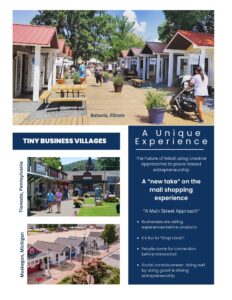A Micro-Retail Opportunity for a Creative Community!

Primary Goal
The Morgan’s Point Resort Economic Development Corporation (MPR EDC) is community development 501 (c) 4 organization committed to seeing people in the city of Morgan’s Point Resort (MPR) living healthy and happy lives. Our mission is to create a space that will be that place that brings us all together, fostering community spirit, filled with people of all ages enjoying themselves and where lasting memories can be made.
Secondary Goal
It is obvious that the MPR commercial district needs revitalizing and added “curb appeal”. It is equally obvious that the work to lift the MPR commercial district is more than our city leaders can do alone. Revitalizing requires a community effort. Therefore, the MPR EDC would like to set an example of “revitalization and curb appeal”, by sponsoring a MPR Tiny Business Village that can provide a low-cost launching pad for pilot businesses that are not yet ready to stand on their own.
Benefits Economic Community Development (Pop Up Demonstrations)
(Main Street Approach) Buy in from both public and the private sectors is critical for any community development activity. It opens the door for conversation and helps build in the ability for longer term impact beyond individual activities. Placemaking (creating a place where people want to be) in public spaces has the ability to spur investment by the private sector and vice versa. It is not about creating a plan and hoping people buy into it. It is about starting to do things that build love for a place. That love will in turn, build confidence in the future of that place and encourage other people to demonstrate their love through investment.
Ottumwa, Iowa- The community’s first dive into the “placemaking” world has resulted in many projects that started as “demonstration ideas now being implemented as permanent elements of place in downtown. People of all ages and diversity came together and changed the look and feel of Main Street. Both quick changes that have now translated into more livable space withy seating, art and activities for families; pop up stores have opened permanently; reimagined open spaces now include innovative stormwater management, public art, safety features and host a variety of events for community members to be part of a significant change in the appearance and enjoyment of the downtown space.
If you would like to participate in the steering committee, please contact Linda @ LIN1326@aol.com or 760.310.7861
Example of a “Tiny Business Village”- Tionesta Market Village (Pennsylvania- population 500)
- City’s Industrial Development Corporation bought an empty lot with a goal to create a healthy traffic in the downtown that would boost sales at existing businesses, spur new businesses, encourage facade improvements and attract a developer to the empty lot.
- Purchased standard outdoor sheds, then designed Eighteen Hundred- western style false fronts for the sheds.
- Sheds have no heat or air-conditioning, so they are seasonal. (MPR EDC Sheds will each have a heater/air-conditioned)
- Sheds are leased annually. Rent is $50–$70/month plus electric. A Business startup is minimal +/-$500 (MPR EDC cost to be determined)
- Tenants share the cost of collective advertising (MPR will require vendors to share in cost of insurance)
- When multiple sheds are used, best results are received when vendors are required to be open during the same hours.
- Results- the idea was to create a temporary solution for the empty lot. The community loves it and it is now permanent. The lot is now vibrant and attractive. Artisans are selling their products, tourists are coming to see “the Village”, residents and seasonal residents are coming back to the downtown; a couple of the “shed shops” have hired part-time help. The project shows that “pop ups” work and are good for a community.
-
- Specific benefits of a tiny business village:
- It pulls down barriers to entry so people can try a business idea for significantly less money. That means a failure can be a learning experience, not a financial catastrophe.
- It also means more people can participate. If it takes a few thousand dollars instead of tens of thousands to get started, more people can try.
- Businesses that could never afford their own storefront can afford a tiny business chalet. Your artisans, crafters, food producers, and other tiny enterprises benefit from the added sales and exposure that couldn’t otherwise afford to access.
- This smaller business can be a steppingstone to a larger business because of what business owners learn and what they earn.
- It converts a nonproductive empty lot into a lively business place.
- It draws customers to the commercial area and surrounding businesses benefit from that extra shopper.
- The outdoor public space can be a gathering spot, a recreation area, or any other public use of it. Gives people a reason to stay and hang out. Tionesta Market Village even offers free Wi-Fi to encourage lingering.
- Participating tiny businesses can cooperate on shared advertising and promotion.
- They’ll all automatically benefit from shared exposure. Because you get a variety of different little businesses, they each draw different customers. It’s easy for those customers to discover the other tiny businesses, because they’re all together in the little village.
- Specific benefits of a tiny business village:
Additional resources and examples of Tiny Business Villages
